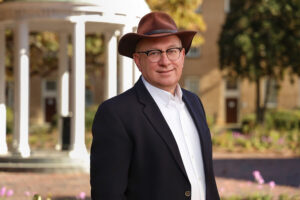HILLSBOROUGH (September 22, 2025) – UNC-Chapel Hill’s former provost sued the university’s Board of Trustees Monday, saying the board repeatedly violated state open meetings and public records laws – and even used a platform that deletes texts after they’re read to evade the law.
Chris Clemens, a respected astrophysicist and a recognized conservative, joined UNC’s faculty in 1998 and became the university’s provost – its chief academic officer – in 2021.
The suit he filed in Orange County raises abundant questions of secretive governance and evasion of North Carolina law by the UNC-Chapel Hill board.
“This Complaint will show a pattern and practice by the UNC Board of Trustees by systematically hiding matters of grave public concern behind closed doors: invoking closed session for reasons not authorized by statute; conducting deliberations electronically without proper notice or public access; and deliberately communicating about public business on auto-deleting platforms such as Signal to evade records retention and public inspection,” the lawsuit says.
“The result is the same each time – less transparency, less accountability, erratic governance, and a steady erosion of public trust in the nation’s first public university.”
The complaint lists several instances where policy issues that should be discussed in public – including realignment of athletic conferences – were instead discussed in closed session.
BUT IT focuses principally on a Board of Trustees meeting in March where the board was scheduled to consider dozens of nominations of faculty for tenure.
“The Board entered closed session under the ‘personnel’ exemption (to the Open Meetings Law) ostensibly to consider tenure candidates. Once the doors were closed, however, the discussion turned to tenure as a policy – its existential value to UNC, its financial implications, and whether to defer an entire slate,” the suit says.
“North Carolina law draws that line with clarity: specific personnel matters may be closed; general policy must be public. By debating tenure policy in secret and acting on that secret debate, the Board crossed the statutory boundary and violated the Open Meetings Law.”
The Board delayed a vote on tenure – normally a perfunctory action – in March, though it eventually approved the tenure applications in June.
The suit says Clemens’ role underscores the point about secrecy.
“As Executive Vice Chancellor and Provost, he briefed deans and vice chancellors internally about the Board’s tenure policy posture after a closed session so they could manage faculty expectations. The Board’s subsequent effort to punish him for ‘leaking’ closed-session information only highlights the culture of secrecy at odds with the Open Meetings Law and the Public Records Law.
“Those statutes authorize closing a meeting – not gagging lawful discussion of policy that belongs in public.”
THE LAWSUIT alleges that then-Board Chair John Preyer used Signal to contact a majority of board members – which constitutes a public meeting under the law – to arrange a no-confidence vote on Clemens.
Clemens was asked to resign as provost, which he did. He remains a professor of physics and astronomy.1
It also alleges that Jed Atkins, the dean of UNC’s new conservative School of Civic Life and Leadership, communicated with Preyer via Signal about Clemens’ discussion with the deans, and that Atkins required members of his leadership to all use Signal.
THIS EXPLOSIVE CASE raises multiple questions about university governance and, frankly, the rule of law – especially at a university with a School of Government and a School of Law.
This board has been warned before – in a January 2024 memo from UNC System President Peter Hans and UNC Board of Governors the-Chair Randy Ramsey – about overstepping its role as an advisory board, not an administrative one.
But compliance with the state’s open meetings and public records laws is Open Meetings 101. Governing boards can only go into closed session for very specific purposes, such as to discuss personnel, land acquisition or economic-development agreements.
Among the many questions the case raises about how the University is governed:
•Just why did the Board delay tenure? And why was it debated in closed session? We don’t know, because the discussion happened in closed session.
•If these allegations prove to be true, why did the University’s general counsel allow the violations to happen in closed session?
•What was Chancellor Lee Roberts’ role? (Roberts is not named as a defendant in the suit.)
•Does North Carolina’s Public Records Law extend to technology such as Signal? Are its deleted messages recoverable?
•And if administrators were required to use Signal, does the University have a contract with Signal? If so, that would be telling.
Discovery is going to be real interesting in this case.
1 https://www.unc.edu/posts/2025/04/03/message-about-provost-and-chief-academic-officer-chris-clemens/.

Leave a Reply